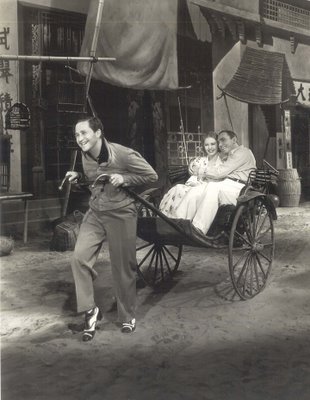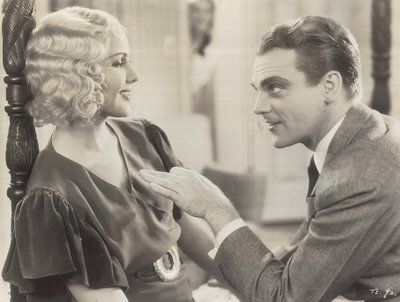

 Favorites List --- Hard To Handle
Favorites List --- Hard To HandleJames Cagney seems to have been many different people during a long life (he made it to 86). Liberal in his youth, conservative in maturity --- "urban barbarian" on screen, aspiring intellectual off (check out this off-screen shot of a subdued Jim at his piano) --- squeezing the last dollar out of Warner Bros. through bitter and ongoing contract disputes, then making donations to itinerant lettuce pickers. A somewhat remote personality, and difficult to know. He wouldn’t watch the movies he made and said most were rubbish, but he wanted to be paid handsomely for doing them, and few stars kept a closer eye on popularity standing than Cagney. Whenever it went up, he’d send brother Bill (William Cagney) up to Jack Warner’s office with demands for more cash. The spring and summer of 1932 found both Cagneys chafing under $1250 a week, a low number in view of Jim’s meteoric rise to stardom within the previous year, and a pittance compared with Dick Powell’s $4000 stipend. The bosses said he was an ingrate and dismissed him out of hand. Jim said Screw Acting and went to New York with every intention of applying to Columbia Medical School. He wasn’t bluffing either. There was enough money saved up, and besides, his brothers had gone into medicine and Jim didn’t want to end up like one of those old actors hanging around a theatrical club. Warners panicked in the face of exhibitor demands they kick in with Cagney bookings promised in sales annuals (here’s a relevant page from one of them). An arbitration sit-down at the Academy Of Motion Pictures finally ended the stalemate with a new deal --- $3000 a week, $1250 of the money to go into trust and held against further disruptions on Cagney's part (and yes, there would be more of those), with an understanding that by 1935, he’d be upped to $4500. The triumphant return to assembly lines would be Hard To Handle, and much publicity for that would revolve around the salary squabble.


All Is Forgiven, said the ads, but neither side would forget. Cagney made no disguise of his contempt for front office types, and that extended to in-laws and peripheral boot-lickers. Director Mervyn LeRoy was both of these, and Cagney would accuse him of congenital sycophancy (LeRoy married Harry Warner’s daughter). Jim felt that with a good script and cameras in place, any idiot could direct movies. He said LeRoy used to signal Action!, then amble out among players to give final instruction. Before calling Cut, he’d walk back onto the set and congratulate everyone for a scene well played. All this was for the benefit of front office bosses watching the dailies later on, said Cagney; just a device for LeRoy's showing off and emphasizing his own contribution. There could well be something to this story, for I noticed Mervyn popping up in several of those Warner Breakdown reels we’ve been seeing lately as DVD extras. By the way, that’s LeRoy pulling a rickshaw for Pat O’Brien and Josephine Hutchinson during Oil For The Lamps Of China in 1936. Just substitute any combination of Warner brothers for the two actors and you’ll have a pretty good idea of LeRoy’s image in Cagney’s mind.


They really piled on the caveman stuff in selling Hard To Handle. When That Red-Headed Sex Menace Kisses ‘Em, They Stay Kissed --- The Screen’s Prodigal Son-Of-A-Gun Gunning For Blondes --- He’s As Handy With His Misses As He Is With His Mitts. Hey, why can’t they sell pictures like this today? Hard To Handle finally showed up a few weeks ago on TCM after being MIA for awhile, and what a peach it is. The later Cagney classics may have more polish, but these Pre-Codes (of which this is most definitely one) are like listening in on a vulgar joke told at a men’s smoker, and wouldn’t it be nice if we could get back to movies that are on and off in eighty minutes or less? Hard To Handle revels in the nastiest aspects of human nature. Everybody’s got an angle in Cagney’s depression world. It really was the Age Of Chisel-ry. The public is like a cow, bellowing to be milked, he says, in one of the few lines I could comprehend during that rat-a-tat salvo Cagney opens with. Did urban dwellers talk so fast as this? Do they still? Down here where I live, you could get ninety minutes of footage out of the sixty seconds it takes for Jim to deliver what must have been ten pages of furiously cynical monologue. This picture has some of the zestiest writing I’ve heard in movies. Jim’s energy is almost maniacal (It won’t rub in! It won’t rub in!) --- like Cody Jarrett before he started robbing trains and killing people. Angry mobs are several times in pursuit of Cagney here, funny yet unsettling scenes as there’s real intensity in the faces of all those crazed extras. People played for keeps in those desperate times. I kept thinking if they caught up with Cagney, they’d kill him. Everybody looks so hungry in Hard To Handle. You’d have to assume those bits and day players got barely enough to eat on, and that gives even the smallest performances a sense of urgency and authenticity movies lost when the Code and better times sanded off the rough edges.



One of the things I like best about pre-code films is --- they’re unpredictable. Not so the grosses on Cagney pre-codes, however. You could depend on those like the sunrise. Numbers from the Strand in New York alone seemed enough to pull them through, for Jim’s urban audience was large and loyal. He was the identification figure that never let them down. Hard To Handle, like all his others, was shot in Warner’s bargain basement, thus a negative cost of just $215,000. With domestic rentals of $362,000 and foreign at $151,000, the final profit was $70,000, hard depression dollars. Having been off the screen over six months owing to his strike, audiences were thrilled to have Cagney back. The publicity attendant upon his battle with Warner Bros. only emphasized a rebellious image and increased the respect they had for him. In the end, that greater salary Warners would pay was well worth it. Jack L. acknowledged as much in his autobiography years later. Considering how quickly the studio turned these things out, it’s a miracle standards remained so high. There’s hardly a dog in the Cagney lot during this period. . I only hope that Warners will get around to putting some of them out on DVD, as I think they’d be a real discovery for a lot of viewers.